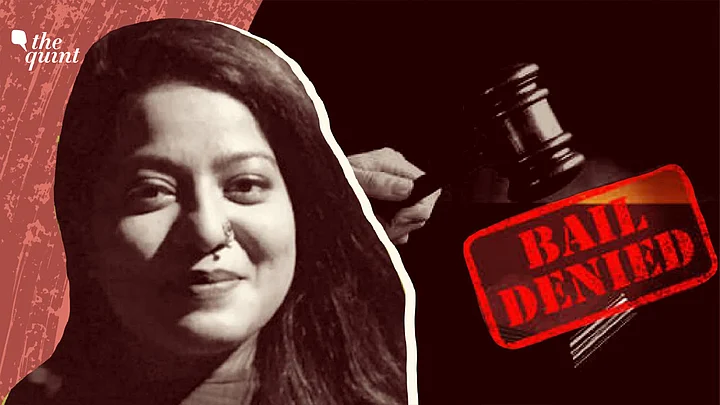After two days of exhaustive arguments between the lawyers of Jamia Millia Islamia student and Anti-CAA activist Safoora Zargar and the Delhi Police, Zargar was denied bail again in Patiala house court presided by additional sessions judge (ASJ) Dharmender Rana on 4 June.
The 27-year old, who was arrested on 10 April 2020, is over five months pregnant and has been lodged in Tihar Jail on judicial custody after she was arrested under FIR 59. This is the FIR under which the anti-terror law, Unlawful Activities Prevention Act (UAPA), has been invoked in connection to the Delhi riots.
The Quint has learnt, that this was the third time Zargar’s lawyers were moving court for bail. It lasted about eight hours over two days, 30 May and 4 June, under the jurisdiction of additional sessions judge (ASJ) Dharmender Rana.
Zargar’s lawyers had moved court for bail earlier on 18 April when UAPA was not yet invoked, which was rejected on 21 April after the invocation of the anti-terror law. Then again on 2 May a bail application was moved, but withdrawn after arguments in court. This was therefore the third attempt to get Zargar out of custody.
The prosecution alleged that her "inflammatory speech" on February 23 led to violence and rioting in North East Delhi. While dismissing the plea for bail, Rana noted, “I do not find merits in the bail application, it is accordingly dismissed.”
What Zargar’s Lawyers Argued
The court order says that Zargar’s lawyers argued that the investigating agency is creating a false narrative to implicate innocent students who do not approve of the government’s policy or government legislation and that ‘dissent cannot be stifled by resorting to state’s coercive machinery’.
Her lawyers also said that Zargar was an innocent lady who simply holds a divergent view on the Citizenship Amendment Act.
It was argued in court that Zargar has polycystic ovary syndrome (PCOD) which could increase her chances of miscarriage.
The court order reads: “It is submitted that the applicant/accused is 21 weeks pregnant. She is also reported to be suffering from Poly Cystic Ovarian Disorder and has a reported history of urinary tract infection. It is submitted that her condition becomes all the more vulnerable due to the pandemic COVID-19 situation.”
In May, Zargar was targeted excessively on social media, with fake claims around her pregnancy and marital status. The claims were found baseless and false and reflected the trolling activists, students and many others are exposed to.
What the Public Prosecutor Argued
The counsel for the state argued that there was enough material available on record to show that Zargar was involved in Delhi riots and the prosecution has rightly invoked UAPA.
The counsel spoke about a particular section under UAPA, Section 43 (D), which places a statutory embargo on the power of the court to release the applicant. The PP argued that ‘at this stage the court is not required to dwell deep into the merits of the case.’
Stressing on the the copy of the WhatsApp chats collected during the course of the investigation and statements of witnesses recorded under section 161 and 164 of CrPC. the PP justified the invocation of UAPA against Zargar. They went on to say that it was evident ‘that Delhi riots were the result of a larger conspiracy to disrupt the normal functioning of the city and to overawe the government machinery by resorting to force and violence. It is forcefully argued that under these circumstances, the applicant/accused is not entitled for bail.’
Judge Concludes: Bail Denied
Referring to the Zargar’s statements recorded under Section 161 and 164 of CrPC coupled with the WhatsApp chat available, the judge said that it could safely inferred that there is prima facie evidence to show that there was a conspiracy to atleast ensure blockade of the roads (chakka jaam).
Rana went on to say that on the basis of the material available on record, one cannot ignore the case of the prosecution that the accused persons have conspired to cause disruption of such an extend and magnitude that it would lead to disorderliness and disturbance at an unprecedented scale. Adding that he therefore, disagreed with Zargar’s lawyers who were trying to argue that UAPA could not be validly invoked against her.
Speaking about Zargar’s medical condition, the judge said, “keeping in view of the precarious medical condition of the applicant/accused, the concerned Jail Superintendent is requested to provide adequate medical aid and assistance to the applicant/accused.”
(At The Quint, we question everything. Play an active role in shaping our journalism by becoming a member today.)
